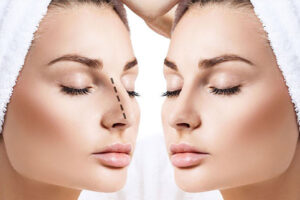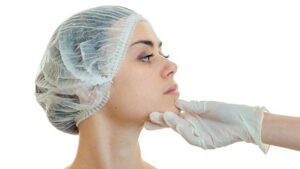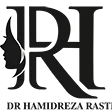Care after nose surgery
Rhinoplasty is one of the most sensitive nose surgeries. And after that, there is a need for special care after the operation. Some patients lose their desired results due to not knowing the care after nose surgery. The important questions that are asked in this context are:
What should we eat after nose surgery? What should we not eat after nose surgery? And many other questions that we try to answer in this article. If you do not find the answer to your question, enter your question in the search section of the site to see the topic related to your question.
Complications and symptoms after nose surgery
which should be careful for the following nose surgery are:
Swollen, stiff, and bruised nose and cheek area, including bruises and swollen eyes. Nasal congestion, nasal discharge and headache. Numbness or swelling in the nose, lips and cheeks.
These are natural experiences that are the result of a process in which the skin, facial bones, tissues and sensory nerves heal. Painkillers will help you cope with these problems.
But if you have continuous severe pain, be sure to contact us.
To reduce any redness and swelling, you can use a soft, cool (not cold) compress on your eyes and nose.
Do not apply ice or anything frozen directly to the skin. Do not put anything cold on your cheeks or neck. Soak plain white towels or gauze squares in ice water and wash well. Apply each compress gently. Use ice packs for 20 minutes every two hours for 48 hours after surgery and make sure not to sleep with them on. Do not apply any heat.
High fever, severe nausea and vomiting, persistent dizziness or incoherent behavior, such as hallucinations. Any pain that cannot be controlled by your pain medication. Excessive bleeding or discharge from the nose or mouth.
A grossly disfigured appearance, excessive bruising, or accumulation of fluid near your face or nose is something you should tell us about.
But don’t worry at all, with our suggestions in the field of care after nose surgery, the percentage of these problems will be greatly reduced.
Read more: percentage and factors of death in nose surgery
Duration of splint stay in care after rhinoplasty
You may have a splint on your nose to protect and support the nasal structures while they begin to heal. Do not remove this splint for any reason, unless it is removed by a doctor.
No smoking or alcohol
This is very important. Smoking, tobacco use, or other forms of nicotine use can interfere with wound healing. Avoid nicotine or alcohol for at least 3 weeks after surgery.
Take a shower
You may shower after surgery, but make sure your face doesn’t get wet. It is very important to keep the splint on your nose dry at all times. You can take a shower every 4 days, but follow the mentioned tips.
How to sleep after nose surgery
Keep your head up while sleeping. This will reduce swelling and make it more comfortable for you. Do not sleep flat or on your stomach.
Learn more: Complications of nose surgery in old age
Activity
Rest, but not bed rest. While rest is important in the early stages of recovery, it’s just as important that you walk. Take 10 minutes of light walking indoors every 2 hours for recovery. It can reduce inflation. Always keep your head up. Do not lean forward or up.
Do not blow your nose for any reason. If you have to sneeze, do it through your mouth.
Avoid activities that increase heart rate and blood pressure, including exercise and heavy work.
bandage:
In care after nose surgery, dressing is an important factor. Change your dressing. We may have gauze under your nostrils. These are contaminated with blood and blood. And it sticks to the skin of the nose. To change the dressing, if necessary, be sure to see a doctor.
medicine
Take all oral pain relievers and antibiotics as directed. Taking the right medicine for the right time is one of the important principles of care after nose surgery. For less severe pain, use over-the-counter acetaminophen. Prescription pain medications can contain acetaminophen.
Nutrition in care after rhinoplasty
Fluids are vital after surgery. Stick to cool, non-carbonated, non-alcoholic, caffeine-free, sodium-free and green tea drinks, including fruit juice and water, milk and yogurt drinks. Do not drink anything hot or cold. It is better to drink liquids with a straw. You should drink at least 200 ml of fluids every 2 hours. For the first 24 hours, use liquid, soft and nutritious food. Drinking plenty of fluids can complete the care after rhinoplasty.
Your first year
Your appearance will continue to improve. It may take up to a year for all the swelling to go away and for the final look of your nose to be achieved. Rhinoplasty is one of the most complex plastic surgery procedures, and recovery is often unpredictable, as the delicate bones of the nose may change during the healing process. Results may not be as expected. In some cases, a secondary method may be recommended to refine your results.
The end of one year is equivalent to the end of care after nose surgery. You can completely go about your daily life with a new nose and a new look.

Rhinoplasty recovery timeline
You may be eager to see the results of your rhinoplasty (nose job) right away, but the healing process takes time. During this time, there are steps you can take to speed up the healing process and ensure that everything heals properly. 13. Do the following to be your own doctor and complete the care after rhinoplasty.
The average recovery time for rhinoplasty is one year. It may seem long, but it becomes much more manageable when broken down into a timeline. The following recovery milestones may vary from patient to patient, but in general, it goes something like this:
1 week: The splint can be removed from the nose and you can go out in public without significant signs of surgery, unless there is bruising around the eyes. It may take 2 weeks to fix this problem. It is safe to resume daily activities.
2 weeks: Most of the facial swelling has subsided and most of the bruises should be resolved.
3-4 weeks: You can safely return to cardiovascular activities such as running, swimming and cycling.
6 weeks: Bones are stable, you can resume resistance training (weight lifting), wearing glasses and picking your nose.
3-6 months old: Numbness and abnormal sensation in your nose and nasal skin should go away.
1 year: The healing process is complete – the swelling should have completely subsided and the new shape of the nose should be completely corrected. There is no need for care after nose surgery.

13 tips to speed up rhinoplasty recovery time
Is there a way to speed up this timeline? There are actually a few things you can do to make your plastic surgery recovery easier. We recommend the following tips:
The best nose surgeon in Tehran
1. Listen to your doctor
Obedience to the doctor’s orders is the first word in care after rhinoplasty. You can read 100’s of articles on the web, like this one on post rhinoplasty care, but nothing compares to the information you get from your facial plastic surgeon. You will receive specific instructions about what medications to take, when to take them, how to take care of the surgical site to prevent infection, and when to return for follow-up appointments. Dr. Hamidreza Rasti, who is one of the best nose surgeons in Tehran, can guide you even over the phone for a faster and painless recovery.
2. Listen to your body and wash properly
Your plastic surgeon can see how your rhinoplasty recovery is going from the outside, but only you know how you feel. One of the principles of care after rhinoplasty is to listen to your body – if something doesn’t feel right after surgery, talk to your doctor right away.
Regarding cleaning and washing the nose, it must be done with the head. Keep your serum in the refrigerator. And avoid making homemade serum separately so that all the care after your nose surgery is not lost.
Washing should be done with a 10cc syringe 5 to 6 times a day. Washing should be done in such a way that the syringe is in a vertical position of 90 degrees and perpendicular to the face, and the head of the syringe is placed in the nose, and wash it slowly by emptying the serum in the nose.
3. How to sleep after nose surgery
Sleeping on your side after rhinoplasty is not only uncomfortable, but it can also prolong your recovery time by causing additional bruising and swelling. Scarier, it can move your nose. To prevent this, you should keep your head elevated at night for 6 weeks after the operation. One of the easiest ways to do this is to put your head on two or three pillows or use a foam pad. Sleeping in a recliner also works well.
4. Use a cold compress
In the first 48 hours after surgery, applying a cold compress can help reduce swelling. Just be careful not to place the compress directly on your nose. Instead, apply it to your cheeks so you don’t accidentally dislocate any bones or cartilage.
5. Get enough rest
The shortness of breath you feel after surgery may make it more difficult to fall asleep, but rest is a vital part of the recovery process. Your body uses energy to heal itself, and a full seven or eight hours of sleep each night gives your body time to restore that energy.
Read more: Side effects of smoking after nose surgery
6. Maintain a healthy diet
What does eating vegetables have to do with recovery after nose surgery? It has a lot to do with it, actually. Eating a balanced diet after surgery can help speed your recovery by giving your body the nutrients it needs to heal itself. Avoid spices as much as possible or use very little.
Protein is the essential building block of skin, muscle, cartilage and blood. A diet consisting of nuts, meat, eggs, yogurt, fish, and other protein-rich foods will help your body repair damaged tissue in and around the nose.
You should also make sure you get plenty of vitamins in your diet, namely vitamin A and vitamin C. Vitamin A, commonly found in dark, leafy greens like spinach and kale, is a great immune system booster. . It can help you fight infections after surgery. Vitamin C plays an important role in the regeneration of collagen, the protein that holds your skin tissue together. Good sources of vitamin C are citrus fruits, Brussels sprouts, and broccoli.
7. Stay calm and be sure to consult before doing beauty work
Steam showers, hot bowls of soup, and relaxing saunas may feel good, but they’re not so good for your swollen nose. Heat causes the tissues in the nose to swell more, which is why it’s best to follow a diet of cool, room-temperature foods, take lukewarm showers, and avoid heat in the weeks following rhinoplasty.
Remember to consult a doctor before doing cosmetic procedures such as gels, botox and facials.
8. Don’t blow your nose, don’t blow your nose and avoid holding your nose with a separate handkerchief
After surgery, you will have a stuffy nose for several weeks, maybe even months. This feeling is caused by the swelling of the nasal tissues. Resist the urge to blow your nose and talk to your doctor about using a saline nasal spray to moisten your nasal passages until the swelling goes down. You can resume blowing your nose 6 weeks after surgery. Be sure to avoid finning your nose.
What about sneezing? You can’t just choose not to sneeze. Instead, try sneezing through your mouth instead of your nose. It sounds bad, but it’s better than damaging the fragile nasal passages and slowing down the rhinoplasty recovery time.
9. Avoid vigorous exercise
In most patients, it takes approximately 6 weeks for the nasal bones to heal after surgery. During this time, you should avoid intense sports. Even movements that seem harmless, such as stretching, lifting, or bending, can increase nasal swelling. Wait until your doctor gives you the green light to resume normal activity before you begin your exercise routine. Care after rhinoplasty requires a calm heart and blood pressure.
Also read: The best nose surgeon in Tehran
10. Do not wear glasses
Sunglasses, reading glasses, prescription glasses—anything that puts pressure on your nose while it’s healing can cause bruising, swelling, or even dents that require rhinoplasty.
Your facial plastic surgeon will advise you when it is safe to wear glasses again. If you cannot see without glasses, hold the glasses with your hand so that the weight of the glasses frame does not rest on your nose. And only when you absolutely need it.
11. Stay away from the sun
It’s always a good idea to protect your skin from overexposure to the sun, but it’s especially important after a nose job. Not only is your nose more prone to sunburn in the weeks and months following surgery, but too much sun can darken any scars and increase swelling. This is related to the heating of the nose and the closed space around your nose.
12. Do not smoke
Both before and after the surgery, it is important not to smoke and if possible avoid being in places where there is smoke and even other people are using. Nicotine in tobacco products restricts blood flow, making it more difficult for the body to heal itself, and interferes with plastic surgery healing.
13. Be patient!
Above all, be patient, you will heal and get the rhinoplasty results you want – it just takes time. Following the steps above won’t turn a year’s recovery into a week, but it will help speed things up and improve your post-surgery experience.
Learn more about rhinoplasty
The rhinoplasty recovery process is different for each patient. But from the moment you have your first facial plastic surgery consultation at Dr. Rasti’s clinic, who is one of the best nose surgeons in Tehran, Dr. Rasti will guide you in every step of this process. If you have any questions about the operation process, etc., you can contact us or ask us below this post, the experts of the surgery room will answer you.
Be sure that we are with you in all stages before and after rhinoplasty and we are fully focused on care after rhinoplasty
Read more: The best nose surgeon in Tehran

